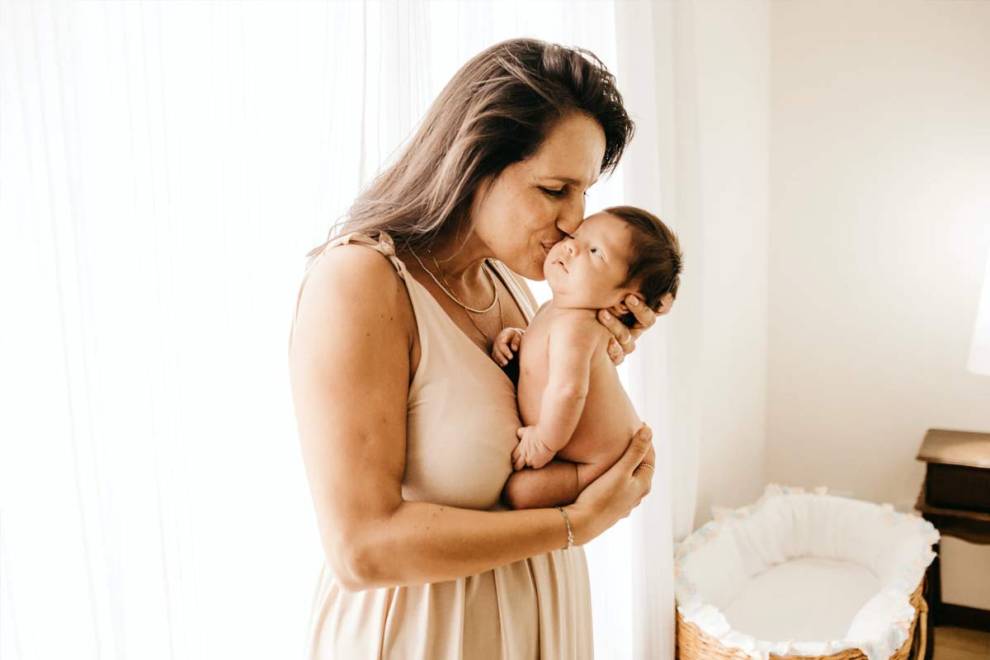Postpartum hair loss might not be what you think it is. We break it down!

Mommyhood101 independently tests and curates baby gear to help you make informed decisions. If you buy products through links on our site, we may earn a commission.
From worries about breastfeeding causing hair loss to fears that it might be permanent, myths and misconceptions can add unnecessary stress during an already challenging time.
The good news? Most of these concerns are unfounded and based on misunderstandings about how the hair growth cycle works.
In this article, we use scientific research findings to debunk 11 of the most common myths about postpartum hair loss. Let’s separate fact from fiction and bring clarity to this often-misunderstood topic:

Myth 1: Breastfeeding causes hair loss.
Fact: Postpartum hair loss is primarily due to hormonal changes and is not due to breastfeeding (American Academy of Pediatrics, 2023).

Myth 2: Hair loss indicates poor health.
Fact: Postpartum hair loss is a natural part of the hair growth cycle and is typically not a sign of poor health or eating (Journal of Clinical Dermatology, 2023).

Myth 3: Postpartum hair loss is permanent.
Fact: Postpartum hair loss is temporary and typically resolves within 6-12 months after childbirth. Hair regrowth begins naturally as hormone levels stabilize (American Academy of Dermatology, 2023).

Myth 4: Washing your hair too often causes hair loss.
Fact: Frequent washing does not cause hair loss. The hairs that shed during washing are already in the telogen (shedding) phase, and washing simply helps remove these loose hairs (Mayo Clinic, 2023).

Myth 5: Cutting your hair will stop postpartum hair loss.
Fact: Cutting hair does not influence the hair growth cycle or reduce hair shedding. However, shorter hairstyles can make thinning hair less noticeable and may improve its overall appearance (Journal of Cosmetic Dermatology, 2022).

Myth 6: Only women with long hair experience postpartum shedding.
Fact: Hair length does not affect the likelihood of experiencing postpartum shedding. Hormonal shifts impact the hair cycle regardless of hair length (Dermatologic Clinics, 2021).

Myth 7: Using the wrong shampoo causes hair loss.
Fact: Shampoos and hair care products do not directly cause or prevent postpartum hair loss. However, using gentle products may improve hair texture and reduce breakage, making hair appear healthier (Journal of Cosmetic Science, 2022).

Myth 8: Stress alone causes postpartum hair loss.
Fact: While stress can exacerbate hair loss, postpartum shedding is primarily caused by hormonal changes. Stress may prolong shedding but is rarely the sole cause (Journal of the American Academy of Dermatology, 2022).

Myth 9: Postpartum hair loss affects everyone the same way.
Fact: The degree of hair shedding varies widely. Factors like genetics, age, nutrition, and overall health can influence the severity of postpartum hair loss (National Institutes of Health, 2023).

Myth 10: Hair dye worsens postpartum hair loss.
Fact: Hair dye does not cause or worsen postpartum shedding. However, chemical treatments can damage hair shafts, leading to breakage, which may be mistaken for shedding (Journal of Cosmetic Dermatology, 2022).

Myth 11: You can stop postpartum hair loss with supplements alone.
Fact: While supplements can help address nutritional deficiencies contributing to poor hair health, they cannot entirely prevent hair loss caused by hormonal changes (National Institutes of Health, 2023).
In our personal experience, the most effective solution we’ve found for postpartum hair loss is low-level laser light therapy (LLLT). Read about the top 5 solutions for postpartum hair loss here, and click the below image to see an example of this procedure.
References Cited
American Academy of Pediatrics. (2023). Breastfeeding and maternal nutrition.
Retrieved from https://www.aap.org/en/patient-care/newborn-and-infant-nutrition/newborn-and-infant-breastfeeding/
American Academy of Dermatology. (2023). Postpartum hair loss: Tips for new mothers.
Retrieved from https://www.aad.org/public/diseases/hair-loss/insider/new-moms
Mayo Clinic. (2023). Telogen effluvium (hair loss).
Retrieved from https://www.mayoclinic.org/diseases-conditions/telogen-effluvium/symptoms-causes/syc-20354990
Journal of Cosmetic Dermatology. (2022). Biotin and keratin in hair care products.
Retrieved from https://onlinelibrary.wiley.com/doi/10.1111/jocd.14567
Dermatologic Clinics. (2021). Genetic <p>Factors in hair loss.
Retrieved from https://pubmed.ncbi.nlm.nih.gov/11059377/
(21)00056-2/fulltext
Journal of Cosmetic Science. (2022). The role of hair care products in hair breakage.
Retrieved from https://journal.scconline.org/abstracts/cc2022/cc073n05/p00000-p00000.html
Journal of the American Academy of Dermatology. (2022). Stress and hair loss: A review.
Retrieved from https://www.jaad.org/article/S0190-9622(21)02710-8/fulltext
National Institutes of Health. (2023). Iron deficiency and hair loss.
Retrieved from https://ods.od.nih.gov/<p>Factsheets/Iron-HealthProfessional/
Journal of Cosmetic Dermatology. (2022). Hair dye and hair health: Assessing the risks.
Retrieved from
National Institutes of Health. (2023). Iron deficiency and hair loss.
Retrieved from










